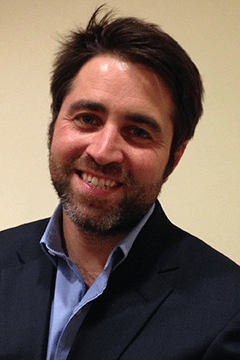
09/08/2015
Many scholars of the troubling current events in the Middle East believe that Turkey plays a role in the region’s future stability.
Sinan Ciddi, executive director of the Institute for Turkish Studies at Georgetown University, will attempt to answer the question of how this country does that on Wednesday, Sept. 16, at SUNY Cortland.
Ciddi, who was born in Turkey and educated in the United Kingdom, will present “Turkey & ISIS: A Reliable Ally” at 4:30 p.m. in Moffett Center, Room 2125.
Organized by the College’s Clark Center for International Education, the event is free and open to the public.
Today, territory occupied by 10 million people in the Middle East is controlled by a Salafi jihadist extremist militant group and self-proclaimed Islamic state and caliphate, which is led by and mainly composed of Sunni Arabs from Iraq and Syria. The group variously is called Islamic State of Iraq and Syria (ISIS), Islamic State of Iraq and the Levant (ISIL) and Islamic State. Its actions have incited a migration towards western Europe, mainly from areas in Iraq and Syria. The group also operates or has affiliates in other parts of the world, including South Asia.
Turkey has been considered a critical ally in the ongoing fight against the forces of ISIS by the United States, according to Ciddi. He will discuss questions determining Turkey’s position towards ISIS and whether Turkey and the United States have a joint plan on how to defeat ISIS.
“Our students should be informed about what Turkey, a U.S. ally, does to stop the spread of this extremist ideology of a minority group within Sunni Islam,” said Alexandru Balas, the Clark Center director.
“If Turkey, a democratic, predominantly Sunni Muslim country, is successful in defeating ISIS, we will all reap the benefits,” Balas said. “If Turkey doesn’t succeed, then a clash of religions becomes a real possibility and this violent clash will not be confined only to the Middle East or Europe but could easily spread to U.S., too.
 |
|
| Sinan Ciddi |
Ciddi has a Ph.D. in political science from the School of Oriental and African Studies, University of London, and has focused his scholarship on Turkish domestic and foreign policy. At Georgetown University, he teaches and conducts research. He is the author of a book, Kemalism in Turkish Politics: Secularism, Nationalism and the Republican People’s Party (New York and London: Routledge, 2009) and book and journal articles.
A decade ago, Balas and Ciddi both taught at Sabanci University in Istanbul, Turkey. The colleagues reconnected in February at the International Studies Association Annual Convention in New Orleans.
Ciddi is “one of the most influential Turkish scholars in U.S.,” Balas noted.
“He will be a perfect guest for our campus given the many initiatives and partnerships we have with Turkish universities,” Balas said.
Approximately 10 faculty members from SUNY Cortland do work related to Turkey on a regular basis, Balas noted. SUNY Cortland has student exchange programs with Anadolu University and Izmir University of Economics as well as new cooperation projects with Zirve University, a SUNY Center for Collaborative Online International Learning (COIL) project.
The College currently is developing a partnership with Istanbul Bilgi University. SUNY Cortland also has quite a large contingent of Turkish foreign students as well as a Turkish scholar in the Physical Education Department for 2015-2016, Kivanc Semiz.
The event is co-sponsored by the Political Science Department, Asia-Middle Eastern Studies Committee and the Campus Artist and Lecture Series.
For more information, contact Balas at 607-753-4348.
Public relations intern Jessica McFadden prepared this article.